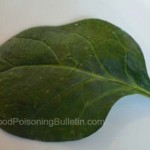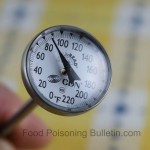The Public Health Agency of Canada has announced an outbreak of E. coli O157:H7 associated with leafy greens has been taking place in the country. Illness onset dates ranged from March 13 to March 31, 2015. The investigation concluded on May 12, 2015. The outbreak is now considered over. A specific source of the pathogenic bacteria could not be confirmed, but leafy greens are possible. There were a total of 13 cases with a matching genetic fingerprint. The case count by province is: Alberta (10), Saskatchewan (1), Ontario (1), and Newfoundland and Labrador (1). And the report ends with advice about safe food handling. All raw fruits and vegetables should be washed under running water before you eat them or cut them. Raw fruits and vegetables can be contaminated with E. coli in the … [Read more...]
Salmonella Sticks Better to Older Lettuce Leaves
A new study has found that older leaves of lettuce support higher levels of Salmonella bacteria. The study, published in FEMS Microbiology Letters (ahead of print) in Oxford Journals, reinforces the concept of purchasing bagged lettuce that is as far away from the expiration date as possible. Salmonella binds to leaves of salad crops and survives for "commercially relevant periods" according to the study. Scientists found that attachment levels were higher on older leaves than on younger ones. The differences were associated with leaf vein and stomatal densities, leaf surface hydrophobicity, and leaf surface soluble protein concentrations. Foodborne illnesses from leafy greens are on the rise in this country. During the time period 1996 to 2005, leafy green consumption increased 9%, … [Read more...]
Leafy Greens No Stranger to E. coli Bacteria
The current outbreak of E. coli in Canada that may be linked to leafy greens is nothing new. According to a University of Georgia research project, E. coli bacteria in leafy greens ranked as the first of the 53 pathogen-product commodity pairs in outbreaks from 2000 to 2007. There were 28 E. coli outbreaks linked to cabbage, lettuce, spinach, sprouts, and leafy green salads during that time frame. The FDA issued the revised Product Safety Rule in September 2014. The rules cover testing of water used in surface irrigation, the amount of time between field application of manure and crop planting, and has redefined labels on "farms" and "mixed use facilities" that streamline inspections during the harvest, storage, and packing steps. A 2013 CDC study found that leafy greens are a … [Read more...]
E. coli Outbreak in Canada: Leafy Greens a Possibility
An E. coli outbreak in Canada has sickened at least 12 people. According to the Public Health Agency of Canada, a specific product hasn't been identified as the case of the illnesses, but leafy greens are considered a strong possibility. Those sickened live in: Alberta (9), Saskatchewan (1), Ontario (1), and Newfoundland and Labrador (1). The illness onset dates range from March 13 to March 31, 2015. All of those people are sick with E. coli that have a matching genetic fingerprint. Leafy greens are a possibility and may include kale, spinach, arugula, or chard. Public health officials in Canada are investigating this outbreak and will announce a source when it has been identified. Whenever there is an outbreak in Canada or the United States, there are sometimes cases in the other … [Read more...]
Research at Texas A&M Studies E. coli on Leafy Vegetables
Research at Texas A&M is looking at E. coli contamination on leafy vegetables. The research looks at how the likelihood that a crop will be contaminated by E. coli before harvest is strongly influenced by both farm management and environmental factors. The study is published in the journal Applied and Environmental Microbiology. Contaminated produce is the most common source of food poisoning in this country. Between 1998 and 2008, of the 68,000 food poisoning illnesses that were assigned to one of the 17 food commodities, 13% were associated with leafy greens. And the number of illnesses caused by leafy greens is increasing, from 6% in 1999 to 11 percent in 2008. The study, led by Dr. Renata Ivanek, cross-referenced environmental data with information from farms in several … [Read more...]
Transport, Storage Temperature Affects Food Safety of Bagged Salad
Temperature fluctuations during commercial transport and retail storage and display can affect the quality and food safety of bagged salads, according to a new study published in the Journal of Food Protection. The study, the first to examine time and temperature in commercial settings, could improve the food safety of leafy greens which are a major source of food poisoning Researchers from Michigan State University in East Lansing, California Polytechnic State University in San Luis Obispo and the University of Cordoba in Spain, measured temperatures on five transportations routes covering four geographic regions. The measurements included two to three days in transport, one to three days in retail storage, and three days of retail display. The conditions were then duplicated in a … [Read more...]
E. Coli Outbreak at Longhorn Steakhouse in Cincinnati Prompts Questions
An outbreak of E. coli associated with the Longhorn Steakhouse in Cincinnati Ohio has prompted some questions about eating at restaurants. While the source of this outbreak was most likely leafy greens, E. coli outbreaks are usually associated with improperly handled or inadequately cooked meat. Whenever I'm at a restaurant, I always ask some questions before ordering. I ask if the steak has been mechanically tenderized, and I ask if they check the temperature of their burgers with a food thermometer before serving. There are good scientific reasons behind these questions. Foodsafety.gov has a chart of the safe minimum cooking temperatures for all foods likely to harbor pathogenic bacteria. Steaks that have been mechanically tenderized should be cooked to 160 degrees F, or well done. … [Read more...]
Freshpoint Toronto Recalls Burger King, Sysco Salads for E. coli 0157:H7
Freshpoint Toronto is recalling more salads for possible E. coli 0157:H7 contamination. There is an outbreak of E. coli infections in New Brunswick, Nova Scotia, and Ontario associated with lettuce from California used by FreshPoint. A recall of FreshPoint lettuce was issued on January 12, 2013. At least 26 people are sickened in the outbreak so far. Most of the cases have recovered or are recovering. The reported illnesses occurred in late December 2012 and early January 2013. The recalled salads are sold under the brand names Sysco, Burger King, PIzza Hut, Yum, and Freshpoint. The products include cut and chopped romaine lettuce, premium chopped romaine hearts, whole iceberg lettuce, chop salad mix, chef salad mix, salad mix harmony, and combo separate salad. You can see all of the … [Read more...]
Ohio E. coli Outbreak In Hamilton County, Leafy Greens Suspected
An E. coli outbreak likely caused by leafy greens has sickened five people in Hamilton County, Ohio, Food Poisoning Bulletin has learned. The outbreak was confirmed this morning by Mike Samet, a public information officer for the county's public health department. There are five confirmed cases and one probable case of E. coli 0157:H7 infection which were likely caused by tainted leafy greens, he said. The case patients, four females and two males, range in age from 12 to 83 and first showed signs of illness from December 10 to December 15, 2012. "If, indeed, leafy greens are the source, it’s ironic that this outbreak occurred just days before proposed rules were issued by the FDA which require new safety precautions affecting vegetables as well as other food products," said Fred … [Read more...]











